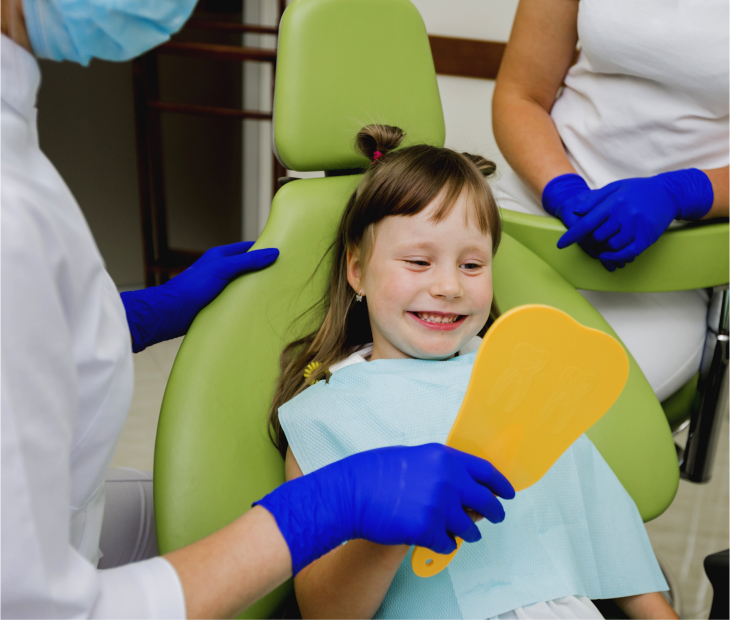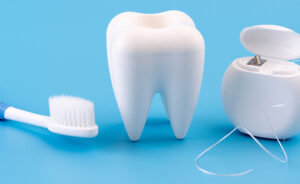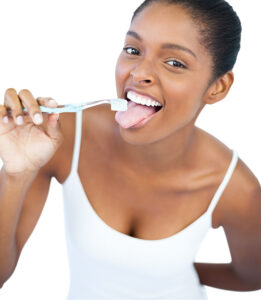September 15th, 2020
September is gum care month. Let's take a look at some great habits to have as a routine for clean and healthy mouths.

1. Eat a nutritious diet: Eating a balanced nutritious diet that is low in sugar and carbs gives your body the nutrients it needs to function correctly. It can help your body fight off harmful bacteria, inflammation, and infection.
2. Brush twice a day: Both plaque and tartar contribute to gum disease. Brushing twice a day will help to break this down and keep your gums healthy.
3. Floss: It's very important to floss when it comes to taking care of your gums.
This is because flossing can help you remove particles of food that get stuck in the crevices of your teeth.
There are different types of floss.
- Unwaxed floss is thin nylon floss made of about 35 strands twisted together.
- Waxed floss is a standard nylon floss with a light wax coating.
- Dental tape is broader and flatter than standard floss and comes in waxed or unwaxed versions
Consult with your dentist so they can advise you on which floss is right for you.
4. Brush Gums: This comes to a surprise to most people but brushing your gums gently with circular motions helps remove debris from the gums.
6. See Your Dentist: Regular visits to your dentist can help detect gum disease early. If gum disease is detected, your dentist can recommend a treatment plan to stop it from spreading and can minimize the damage.
Thank you for being part of our family dental practice.
We value your trust and loyalty and look forward to welcoming back our patients, neighbors, and friends.
To schedule a dental appointment:
.
1. 140 Market St, Paterson, NJ 07505
Children's Dentistry - 3rd Floor
Orthodontics Center - 2nd Floor
Treatment Center - 4th Floor
(973) 742-4200
2. 625 Main Ave
Passaic, NJ 07055
Children's Dentistry - 3rd Floor
(973) 574-1000
3. 3196 John Fitzgerald Kennedy Blvd
3rd Floor
Union City, NJ 07087
(201) 325-8444
Tags: flossing, floss, gum care, take care of your gums, unwaxed floss, waxed floss, dental tape, gums hurst, my childs gums
Posted in Dental Problems, Dental Tips, Dental Health, Health Info, Health Blog, Health Article, Dental Article, Gum Care | No Comments
November 19th, 2019
1. Brushing too fast
brushing should be between 30 seconds and 2 minutes twice a day
You can damage enamel brushing too fast. Slow to moderate speed brush strokes is ideal.

2. Not Flossing
Flossing helps to remove bacteria hidden. In one corner we have gum disease and the other corner, the heavyweight champ, Floss! Gum disease affects mainly adults but can happen at an early age, especially if you don't have a proper oral care routine, which includes flossing every day. Floss comes out the winner!

3. Not using the right toothbrush
We recommend buying a chargeable electric toothbrush.
We realize that is not always an option, so we recommend using toothbrushes with soft bristles as these are much more effective. Avoid buying hard toothbrushes. These can damage tooth enamel and toss out toothbrushes after 2-3 months because they get rough. These can damage tooth enamel.
4. Not brushing your tongue
When brushing your teeth, brushing your tongue gently will rid
of bacteria that gets collected on your tongue called biofilm.
This type of bacteria can lead to bad breath and even tooth damage.
The tongue itself has peaks and troughs that are a perfect place for bacteria to thrive and settle. In fact, Its a leading cause of bad breath.
Let's brush those tongues and battle bacteria.

5. Not rinsing after brushing and flossing
Flossing and brushing is not enough. You can leave particles behind.
Rinsing is an important last step to brushing and flossing. Rinsing will
help rid of these excess particles.
6. Not drinking enough water
Drink plenty of water to avoid dry mouth
dry mouth can result in growth of bacteria and fungi which can,
in turn, lead to bad breath.

7. Frequently Snacking
An occasional treat is fine, but repeated sugar intake and other carbs will increase the risk of cavities. Sugar can stay stuck to your teeth.
These sugars can damage your teeth. Tooth decay is caused by bacteria in
the mouth using sugar from foods and drinks to produce acids that
dissolve and damage the teeth.
It's important to monitor and moderate children's sugar intake.

8. Eating Acidic food at night
The acid in the saliva can damage can affect the health of your gums.
It is said to be best to eat at least two hours before your bedtime.
We recommend brushing the teeth before bedtime. This will help to keep
your mouth clean of acids.
9. Waiting too long before your final brush time and bedtime
It is very important to brush right before you go to bed.
Cavities can develop and grow rapidly when the mouth is dry.
Bacteria will eat away at your teeth eventually creating
holes (cavities) and leaving you without your teeth.
Plaque is also an issue. It can harden to form tartar.
plaque and tartar cause irritation, inflammation, and bleeding of the gums,
as well as dental decay, also known as cavities.
Let's make sure to brush our teeth before bedtime.

Bottom:
This article is intended to provide an understanding and knowledge about
Oral hygiene mistakes to avoid. Always seek advice from a professional dentist with any questions you may have regarding your child and medical conditions or treatments.
Tags: Paterson NJ, Passaic NJ, Union City NJ, plaque, bacteria, gum disease, bad breath, dental health, treatment, proper oral care, dentist nj, nj dentist, brushingteeth, brushing, teeth, too fast, twice a day, twice, damage enamel, brushing too fast, moderate speed, flossing, not flossing, floss, routine, flossing everyday, not using the right toothbrush, the right toothbrush, chargeable electric toothbrush, soft bristles, toothbrush is hard, rough bristles, 2-3 months, not brushing your toungue, brush your toungue, brushing my toungue, biofilm, cause of bad breath, battle bacteria, not rinsing, not rinsing after brushing, particles, not drinking enough water, avoid dry mouth, growth of bacteria, bacteria and fungi, bad teeth, bad dental health, frequently snacking, sugar intake, carbs, risk of cavities, sugar stuck to your teeth, sugar stuck, sugar teeth, childrens sugar intake, eating acidic food, at night, acid in saliva, health of your gums, brush before bedtime, final brush time, bedtime, betime brushing, bleeding of the gums, before bedtime, oral hygiene mistakes to avoid, professional dentist, NJ
Posted in Dental Problems, Dental Tips, Dental Health, Health Info, Dental Services, Cavities, Brushing Teeth, Health Blog, Health Article, Dental Article | No Comments










